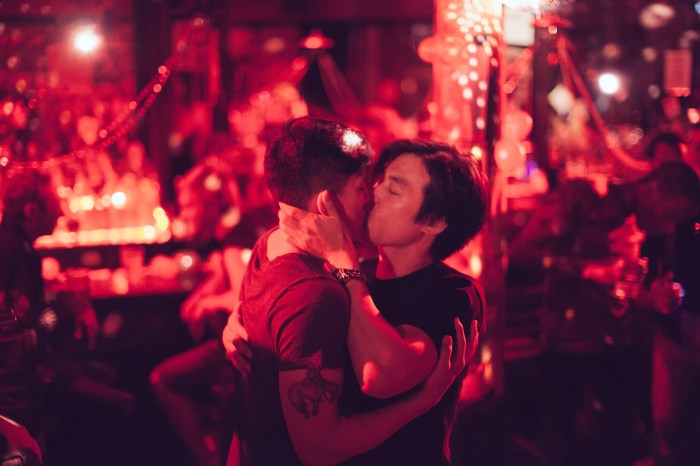BY STEVE ERICKSON / Soon after the Occupy Wall Street movement got underway, an organization called Occupy Cinema appeared downtown. It started by programming a screening of Peter Watkins’ 1971 New Left classic “Punishment Park” Zuccotti Park in mid-November.
What contemporary political films could its organizers have chosen? Apart from some films inspired by the Iraq War, overt politics are notably missing from American narrative cinema these days, dwelling instead in the documentary ghetto. (Protected by its genre and allegorical distance, “Rise of the Planet of the Apes” is a startling exception.)
As it happens, Occupy Cinema did go on to present a contemporary film, Cédric Klapisch’s “My Piece of the Pie,” and the group is involved with a weekend of OWS-inspired films at Anthology Film Archives on January 7 and 8 (anthologyfilmarchives.org).
Of the films on my Top 10 list, the Chinese documentary “Petition” seems most relevant to the Arab Spring and OWS movements. Made two years ago, it depicts ordinary Chinese men and women standing up against their government, even becoming homeless in order to file lawsuits against it. Their courage is breathtaking.
Director Zhao Liang went on to make “Together,” a treacly feature-length PSA about HIV awareness funded by the Chinese government. While not an entirely bad film, it killed off Western festivals’ interest in him, even as he became the subject of a lengthy New York Times feature in August.
OWS has already been the subject of shorts by Jem Cohen (screened at the IFC Center), Jonathan Demme, and Ken Jacobs. There’s a feature in the works, collectively made by 60 filmmakers. I suspect that politics may make a sudden return to American cinema, soon producing our own equivalents of “Punishment Park” or Jean-Luc Godard’s “Le Chinoise” and “Weekend.”
The most indelible images of OWS, however, may turn out to be those from YouTube, such as the line of protesters at UC Davis being assaulted with pepper spray. We live in a time when cinema has no monopoly on the power of moving images.
This was a banner year for documentaries. “Petition” showed that there’s still life left in the cinema vérité school, which avoids overt editorializing or even acknowledging the director’s presence. (The father of cinema vérité, Frederick Wiseman, has a new film, “Crazy Horse,” opening in a few weeks.)
Other documentaries experimented with form. “The Arbor” incorporated elements of fiction, having actors lip-synch interviews with real people and staging theater scenes in the middle of the streets where one of its subjects, the late playwright Andrea Dunbar, grew up.
“El Sicario, Room 164” took the documentary to a new level of stark minimalism. It’s a feature-length interview with a Mexican hit man who worked for the drug cartels. While the hit man constantly draws on a pad of paper to illustrate his experiences, the film relies on his extremely disturbing words, which include graphic descriptions of torture and murder, to sustain the viewer’s interest, and it succeeds mightily.
Less overly political than “Petition,” “Disorder” shows an urban China bursting at its seams with chaotic energy.
Steve McQueen’s “Shame” is far from the year’s worst film, but it may be 2011’s most overrated. Frustratingly, there are many traces of the talent that made his debut, “Hunger,” such a thrilling experience — fine performances (especially from Nicole Beharie, who shines as the film’s voice of reason despite only appearing in a handful of scenes), appealing cinematography, and two stand-out scenes. Anyone who’s seen it can probably guess which ones I mean.
However, the film’s view of Manhattan life is basically “American Psycho” minus the satirical edge. Its coy “ambiguity” about what caused its characters’ trauma is laughable, and its view of sex addiction is ultimately rather conservative and homophobic. Although Michael Fassbender’s character is essentially heterosexual, part of his bottoming out is a visit to a gay sex club, shot in a voyeuristic manner that evokes William Friedkin’s notorious “Cruising.”
When the Fassbender character expresses doubts about the institution of marriage and whether lifelong monogamy is realistic, it seems intended to be part of his pathology, but I think he has a point, at least for some people. Oddly, “Shame” is both schematic and empty — it tells you exactly how pathetic its characters are while leaving them such ciphers that I’ve seen three or four different interpretations of their true sexuality. In a better film, this might seem like a welcome openness. Here, it’s just lazy.
Top 10:
1. “Melancholia” (Lars von Trier)
2. “United Red Army” (Koji Wakamatsu)
3. “The Arbor” (Clio Barnard)
4. “Certified Copy” (Abbas Kiarostami)
5. “Petition” (Zhao Liang)
6. “Rise of the Planet of the Apes” (Rupert Wyatt)
7. “Uncle Boonmee Who Can Recall His Past Lives” (Apichatpong Weerasethakul)
8. “A Separation” (Asghar Farhadi)
9. “Detective Dee and the Mystery of the Phantom Flame” (Tsui Hark)
10. “Into the Abyss” (Werner Herzog)
Runners-up: “Disorder” (Huang Weikai), “House of Pleasures” (Bertrand Bonello), “Hugo” (Martin Scorsese), “Nostalgia For the Light” (Patricio Guzman), “Oxhide II” (Liu Jiayin), “Punished” (Law Wing-cheong), “Rango” (Gore Verbinski), “El Sicario, Room 164” (Gianfranco Rosi), “Terri” (Azazel Jacobs), and “To Die Like a Man” (João Pedro Rodrigues).


































